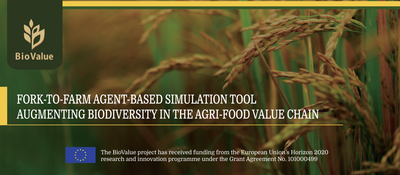BIOVALUE
Fork-to-farm agent-based simulation tool augmenting BIOdiversity in the agri-food VALUE chain | duration: 10/2021 - 09/2025 |
|
|
|
|
A common observation is that crop diversity in Europe declined over the last decades. Thus, crops (various legumes and vegetable cultivars) that can enrich biodiversity significantly are scarcely present in the agri-food value chain and in consumers’ food diets since they are no longer economically viable. The BIOVALUE project will provide strategies for an increased use of biodiversity from underutilized genetically diverse crops and look for options to introduce crop diversity into value chains. The main aim of the BIOVALUE project is to develop a dynamic and customizable tool that will analyse the link among biodiversity, the agri-food value chain, the environment and consumer’s preferences and health. This tool will help to introduce, model, evaluate, produce and spread underutilized, genetically diverse crops and final marketable products produced from them. |
 |
|
The project focuses on a demand-driven approach, from fork-to-farm, explicitly modelling agent interactions and behaviour throughout the value chain (ABM based – agent-based modelling), as well as various present and future climatic and water availability scenarios in Europe and beyond. The final outcome of the project includes complete novel food dishes and novel processed food products that successfully incorporate underutilized, genetically diverse crops and pave the way for their introduction to market and therefore enter agricultural production. |
|
 |
Furthermore, the project will produce a set of key performance indicators to measure policy quality and impact, environmental evolution and compliance with regulations of introducing underutilized, genetically diverse crops to the value chain and is by design expandable to further enhance biodiversity in the value chain. Case studies from 12 countries in Europe are involved as basis for analysis and the data source. The project consortium consists of 17 partners from Greece, Germany, Spain, France, Italy, Estonia, Norway, Hungary, Romania, Zypern, Georgia, Turkey and is coordinated by the Aristotel University of Thessaloniki, Greece. The BIOVALUE team includes universities, research institutes, small and medium-sized companies, farm organizations, consulting companies, thus, merging the knowledge and experience from both - academia and practice. |
|
JLU Giessen is represented within the consortium by the ZEU team (Centre for international and environmental research). In this constellation, integrated to ZEU are activities of the Climatology, Climate Dynamics and Climate Change group (Dr. Elena Xoplaki), the Organic Farming group (Prof. Andreas Gattinger), the Agricultural Economics and Food System group (Dr. Irina Solovyeva), as well as the Landscape Ecology group (Prof. Rainer Waldhardt). ZEU is leading work package 8 on “Enhancing the agri-food value chain biodiversity links via the BIOVALUE tool” which will work on development of normative scenario for the BIOVALUE tool and afterwards test the tool. Within this context the ZEU team will investigate and integrate the improvement options and strategies enhancing crop diversity for each value chain agent and entire value chain. The idea is to study the agents’ perceptions and cooperation strategies and to integrate them into normative scenarios for entire value chain. Apart from that, ZEU will lead the tasks related to modelling the possible effects of climate change on biodiversity and the changing interrelationships between biodiversity, soil and water conditions brought on by climate change. These tasks involve generation of high-quality climate projections for the next decades at daily, monthly and seasonal scales, downscaled to 1 km or higher. Specific emphasis is put on spatial and time distribution of extreme and compound events. Finally, the ZEU team will be involved into the tasks related to the BIOVALUE breeding programme that will study in detail the nutritional quality and postharvest behavior of the planted species in the 7 paired pilot cases (situated in 12 countries chosen for the case studies). The BIOVALUE project is funded with about six million euros, of which JLU receives about 430,000 euros. |
|
|
|
|||||||||||||
|---|---|---|---|---|---|---|---|---|---|---|---|---|---|---|
|
Center for International Development and Environmental Research (ZEU) Justus-Liebig-University, Giessen (Germany) Department of Geography |
Post Doc at the ZEU Justus-Liebig-University, Giessen |
|||||||||||||
|
Senior Researcher at the Professorship for Organic Agriculture & ZEU Justus-Liebig-University, Giessen |
||||||||||||||
| Project partners | Country | ||
|---|---|---|---|
| Aristotle University of Thessaloniki | Greece | ||
| Norwegian Institute of Bioeconomy Research (NIBIO) | Norway | ||
| ECO-SENSUS Research and Communication Nonprofit Ltd | Hungary | ||
|
Ecozept France SARL |
France | ||
| Cyprus University of Technology (CUT) | Cyprus | ||
| SOLINTAGRO SL (SOL) | Spain | ||
| Estonian University of Life Sciences (EMU) | Estonia | ||
| Justus-Liebig-University, Giessen | Germany | ||
| Ege University (EGE) | Turkey | ||
| ALMA MATER STUDIORUM - University of Bologna | Italy | ||
| AXIA Innovation UG - AXIA | Germany | ||
| Georgian Farmers Association (GFA) | Georgia | ||
| Institute for Medical Research - Center of research excellence in nutrition and metabolism |
Serbia | ||
| IDENER Research & Develpment AIE | Spain | ||
| Capacity Development in Nutrition Research (CAPNUTRA) | Serbia | ||
| Confederazione generalle dell agricoltura Italiana (CAGRI) | Italy | ||
| Bioland Beratung GmbH (BIOLAND) | Germany | ||
| Mediterranean Agronomic Institute of Chania (MAICH) | Greece |
|
||||||||||
|---|---|---|---|---|---|---|---|---|---|---|
|
|
The project is funded by European Commission, H2020-EU.3.2.1. - Sustainable agriculture and forestry | |||||||||
|
|
BIOVALUE project fact sheet CORDIS website | |||||||||
| www.biovalue-project.eu | ||||||||||
|
|
||||||||||
| BIOVALUE at Facebook | ||||||||||
| BIOVALUE at Twitter | ||||||||||
| BIOVALUE at Instagram | ||||||||||
